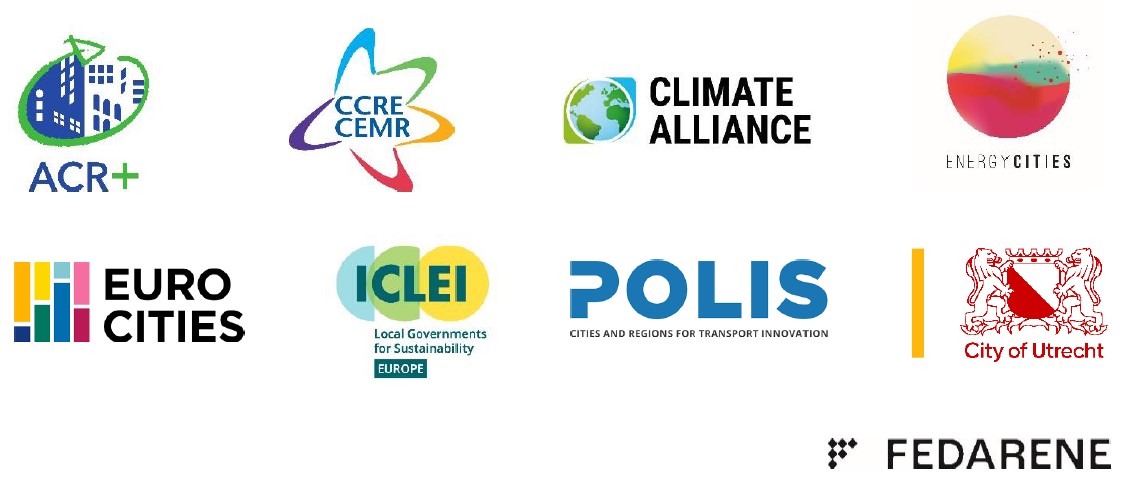Built Environment
Cities, regions, environmental authorities, and partners of the Urban Agenda Partnership on Greening Cities call for urgent adoption of Nature Restoration Law
ACR+ and fellow Europe’s cities, regions, environmental authorities, and partners of the Urban Agenda Partnership on Greening Cities have united to urge EU policymakers to adopt the EU Nature Restoration Law, set for a vote on 17 June 2024.
Read the joint letter.
Dear Heads of State and Environment Ministers,
We are writing to you as a group of cities, regions, environmental authorities, and partners of the Urban Agenda Partnership for Greening Cities representing different levels of government, to express our dismay at the continued delay of the adoption of EU Nature Restoration Law. Failure to adopt the law at this late stage would have dire consequences for nature and would set a dangerous precedent.
A triple planetary crisis with cities on the frontline
We are currently facing a triple planetary crisis of biodiversity loss, pollution, and climate change with cities on the frontline. Over 70% of Europeans live in cities and these crises are undermining nature’s ability to provide ecosystem services vital to health and well-being.
On average, wildlife populations worldwide have declined almost 70% since 19701. While Europe has been warming twice as fast as the global average since the 1980s2, cities are sometimes up to 10-15°C hotter than their rural surroundings3. Between 2000 and 2019, in a study across 854 urban areas in Europe, researchers estimate that an annual excess of 203,620 deaths were attributable to extreme cold and 20,173 deaths to extreme heat4. A third of Europeans are affected by water stress each year5 and 97% are exposed to harmful levels of fine particulate matter6.
The EU Nature Restoration Law is key to protecting green spaces and adapting our cities to climate change
Cities host an array of plant and animal species. 26 of the 28 European (EU 27 + UK) capitals have one or more Natura 2000 sites on their territory with a total of 2,842 Natura 2000 sites (10%) located at least partly within city boundaries7. Between 2012 and 2018, the net land take in European cities and commuting zones was 450km2 annually8. In the context of scarce urban land, cities try to solve space conflicts in intelligent ways, for example by strengthening urban green spaces and biodiversity while still enabling other competing land use priorities. Currently, land-use change is the largest driver of biodiversity loss – and may already have caused a global biodiversity decline of between 2-11% – but recent research suggests that climate change is set to become the primary cause of biodiversity loss by 2050 unless action is taken9. By investing in restoration, societies can build more resilient and sustainable environments that are better equipped to face the challenges of climate change and environmental degradation. The Nature Restoration Law would establish a legal framework and objectives that backs approaches by cities to protect and develop urban green space and support collaboration between all levels of government and a myriad of stakeholders for the mental and physical health of citizens. Indeed, nature knows no boundaries. Cities, regions, and local environmental authorities will need financial and human resources to support them in the implementation of the proposed restoration targets, but they are equally aware that without the Law, the cost of inaction would be unbearable. Therefore, we come together in this letter to repeat our strong support for the final approval of the Law without any further delay.
Continued delay in adoption is a serious threat to the democratic process
Given that a provisional political agreement was reached between the European Parliament and the Council last November10, the continued failure of the Council to support the Nature Restoration Law threatens the integrity of the European Union and its institutions; to renege on a politically agreed piece of legislation at this stage would set a dangerous precedent for future inter-institutional negotiations. What’s more, this Law outlines Europe’s contribution to the internationally agreed Global Biodiversity Framework11. Failure to adopt the Law would send a worrying signal to the international community as to the commitment of the European Union to international agreements in general, and nature and climate in particular. The above has been highlighted already in open letters published by a group of environment ministers12 as well as another by a group of environmental NGOs13.
We therefore call on you, members of the Council, to adopt the agreed EU Nature Restoration Law without further delay.
Yours Sincerely,

1 https://livingplanet.panda.org/en-GB/#:~:text=Wildlife%2520populations%2520plummet%2520by%252069,the%2520health%2520of%2520our%2520planet
2 https://climate.copernicus.eu/sites/default/files/custom-uploads/ESOTC%202023/Summary_ESOTC2023.pdf
3 https://joint-research-centre.ec.europa.eu/jrc-news-and-updates/cities-are-often-10-15-degc-hotter-their-rural-surroundings-2022-07-25_en
4 https://www.thelancet.com/journals/lanplh/article/PIIS2542-5196(23)00023-2/fulltext
5 https://www.eea.europa.eu/highlights/water-stress-is-a-major
6 https://www.eea.europa.eu/en/topics/in-depth/air-pollution
7 The majority (82%) of 808 EU cities analysed have Natura 2000 sites within their city boundaries: https://op.europa.eu/en/publication-detail/-/publication/7bbf6dbd-15cb-11ec-b4fe-01aa75ed71a1/language-en/format-PDF/source-292890947
8 https://www.eea.europa.eu/en/analysis/indicators/net-land-take-in-cities
9 https://www.york.ac.uk/news-and-events/news/2024/research/climate-change-biodiversity/
10 https://www.consilium.europa.eu/en/press/press-releases/2023/11/09/nature-restoration-council-and-parliament-reach-agreement-on-new-rules-to-restore-and-preserve-degraded-habitats-in-the-eu/
11 https://www.cbd.int/gbf
12https://www.gov.ie/pdf/?file=https://assets.gov.ie/293085/e29ea3b4-129d-4ccd-bbcc-cc00e5fcb2f6.pdf#page=null
13https://www.greenpeace.org/static/planet4-eu-unit-stateless/2024/05/20240513-Open-letter-by-civil-society-on-the-rollback-of-green-measures-in-the-EU-1.pdf









